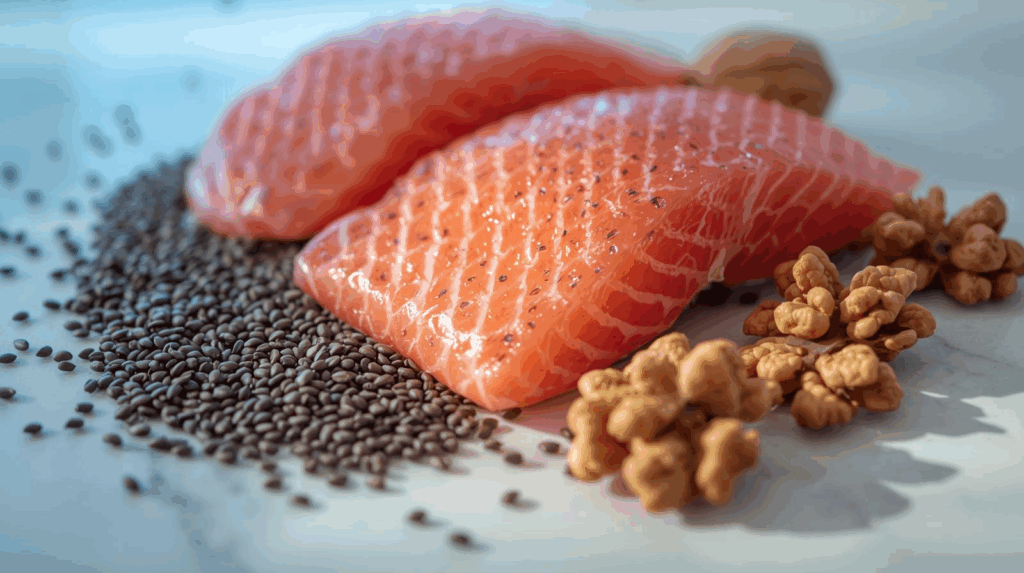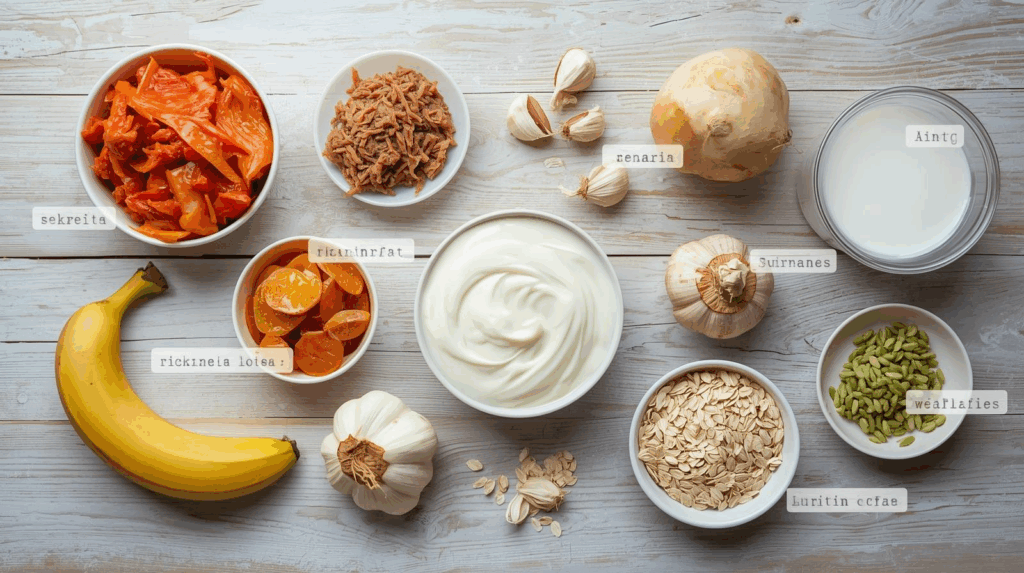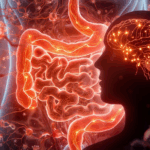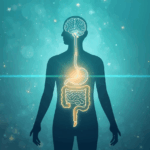Foods That Support a Healthy Gut-Brain Connection (Backed by Science)
Introduction: Why the Gut-Brain Connection Matters More Than Ever
The healthy gut-brain connection has become one of the most fascinating and important discoveries in modern health science. At Healthtokk, we’ve been exploring how your gut health affects nearly every part of your body—from your digestion to your immunity and even your mood. But what many people don’t realize is that your gut and brain are in constant communication through a complex network known as the gut-brain axis.
If you’ve ever felt “butterflies” in your stomach when nervous or lost your appetite when stressed, you’ve already experienced this powerful communication in action. Scientists now understand that a healthy gut-brain connection influences everything from mental clarity to emotional balance and overall wellbeing. In this article, Healthtokk explores the foods that best support this connection, backed by the latest science and expert recommendations.
Before we begin, we recommend reading our earlier articles in this series:
-
[The Role of Diet in Gut Health: Essential Strategies You Need to Know in 2025]
-
[Signs of an Unhealthy Gut & How to Spot Them Quickly (Backed by Science)]
These articles provide a strong foundation to help you understand why nurturing your gut microbiome is crucial for your mind and body. Now, let’s go deeper into how certain foods can help maintain a healthy gut-brain connection and transform your overall wellness.
1. Understanding the Gut-Brain Axis
The gut-brain axis is the communication superhighway between your digestive system and your central nervous system. It’s regulated by the vagus nerve, hormones, and a variety of chemical messengers known as neurotransmitters. What makes this system remarkable is that your gut produces nearly 90% of the body’s serotonin, the hormone responsible for happiness and mood balance.
A healthy gut-brain connection ensures this communication remains smooth, balanced, and effective. But when the gut microbiome becomes imbalanced—due to stress, processed foods, antibiotics, or lack of sleep—it can disrupt brain chemistry, leading to anxiety, depression, brain fog, and fatigue.
At Healthtokk, we believe that understanding this link is key to achieving both mental and physical harmony. By focusing on foods that promote a healthy gut-brain connection, you’re not just eating for your stomach—you’re feeding your mind, too.
2. The Science Behind Food and the Gut-Brain Axis
The science supporting a healthy gut-brain connection is growing rapidly. Research from institutions like Harvard Medical School and Johns Hopkins University shows that what you eat directly affects the composition of your gut bacteria, which in turn influences your brain’s chemistry and behavior.
Certain foods help good bacteria thrive, promoting serotonin production and reducing inflammation. Conversely, processed sugars, artificial additives, and trans fats can weaken the healthy gut-brain connection, allowing harmful bacteria to dominate. This imbalance, known as dysbiosis, can trigger inflammation that affects brain function and mood regulation.
That’s why choosing the right foods is crucial—not just for digestion, but for emotional stability and mental focus. Below, Healthtokk lists the top science-backed foods that support a healthy gut-brain connection, based on credible clinical studies.
3. Top Foods That Support a Healthy Gut-Brain Connection

Let’s dive into the foods that have been scientifically proven to strengthen your healthy gut-brain connection.
| Category | Food | Gut-Brain Benefits | Where to Buy (Trusted Stores) |
|---|---|---|---|
| Fermented Foods | Yogurt, Kefir, Kimchi, Sauerkraut | Rich in probiotics that enhance gut flora balance and boost serotonin production | Amazon, iHerb, Walmart |
| Prebiotic-Rich Foods | Garlic, Onions, Bananas, Asparagus | Feed good bacteria to maintain a healthy microbiome | Whole Foods, Amazon Fresh |
| Omega-3 Fatty Acids | Salmon, Sardines, Chia Seeds, Flaxseeds | Improve brain function and reduce inflammation | Amazon, iHerb, Thrive Market |
| Polyphenol-Rich Foods | Berries, Green Tea, Dark Chocolate | Support gut bacteria and protect brain neurons | Walmart, Amazon |
| High-Fiber Foods | Oats, Legumes, Apples | Promote digestive regularity and nourish gut bacteria | Amazon Fresh, Target |
| Probiotic Supplements | Containing Lactobacillus & Bifidobacterium strains | Replenish beneficial microbes for gut-brain harmony | iHerb, Amazon |
| Bone Broth | Collagen-rich soups | Heal gut lining and improve neurotransmitter balance | Thrive Market, Amazon |
| Turmeric | Contains curcumin | Reduces gut inflammation, enhances brain function | Walmart, Amazon |
4. Fermented Foods: The Cornerstone of Gut-Brain Wellness
Fermented foods like kimchi, sauerkraut, and kefir are rich in beneficial bacteria that play a major role in maintaining a healthy gut-brain connection. These foods help regulate neurotransmitter production, reduce inflammation, and enhance your mood naturally.
At Healthtokk, we often recommend adding small servings of fermented foods to your daily meals. You can start your morning with kefir or Greek yogurt, add kimchi to your lunch, and include a bit of sauerkraut with your dinner. The live cultures found in these foods populate your gut with good bacteria, which directly communicates with your brain via the vagus nerve.
5. The Role of Fiber and Prebiotics
Fiber acts as food for your gut bacteria—especially soluble fiber found in oats, apples, and beans. When digested, fiber produces short-chain fatty acids (SCFAs) that improve gut lining integrity and support the healthy gut-brain connection. Prebiotics like garlic, onions, and bananas are particularly powerful because they selectively feed the good microbes that promote better mental health.
At Healthtokk, we suggest consuming at least 25–30 grams of fiber per day from natural sources. A well-fed microbiome translates to a calm and well-regulated nervous system.
6. Omega-3 Fatty Acids and Brain Health
Omega-3 fatty acids, found in salmon, walnuts, and flaxseeds, are essential for brain and gut health. They reduce inflammation and promote healthy communication between neurons. When combined with probiotic-rich foods, they create an ideal environment for a healthy gut-brain connection.
Clinical studies show that people who regularly consume omega-3s experience better mood regulation, improved focus, and reduced symptoms of depression and anxiety. It’s one of the simplest and most effective dietary changes you can make to enhance your mental wellbeing.
7. Polyphenols: Natural Protectors of the Gut-Brain Axis
Polyphenols are antioxidants found in berries, green tea, and dark chocolate. They not only protect the gut lining from oxidative stress but also stimulate the growth of beneficial bacteria. A cup of green tea daily can strengthen your healthy gut-brain connection while calming your mind and reducing stress hormones.
At Healthtokk, we recommend choosing at least one polyphenol-rich food daily for optimal results. You can enjoy berries in your breakfast smoothie, sip green tea in the afternoon, or indulge in a piece of dark chocolate (70% or higher cacao) after dinner.
8. Turmeric and the Power of Curcumin

Turmeric is an ancient spice now proven by modern science to boost both gut and brain health. Curcumin, its active compound, has strong anti-inflammatory properties that help repair the gut lining and regulate mood-related neurotransmitters like serotonin and dopamine. Adding turmeric to soups, teas, or smoothies daily can enhance your healthy gut-brain connection significantly.
9. Supplements That Support a Healthy Gut-Brain Connection
Sometimes, it’s challenging to get all necessary nutrients from food alone. Here are some supplements Healthtokk recommends for maintaining a healthy gut-brain connection:
| Supplement | Primary Benefit | Where to Buy |
|---|---|---|
| Probiotic Capsules (with Lactobacillus & Bifidobacterium) | Restore good gut bacteria balance | Amazon, iHerb |
| Omega-3 Fish Oil | Supports brain health and reduces inflammation | Walmart, Amazon |
| Turmeric Curcumin Capsules | Strengthens gut lining and supports mood balance | iHerb, Amazon |
| Prebiotic Fiber Powder | Feeds beneficial bacteria | Thrive Market, Amazon Fresh |
(Note: Always consult your healthcare provider before beginning any new supplement regimen.)
10. Foods and Habits That Harm the Gut-Brain Connection
Avoiding harmful habits is just as important as eating the right foods. Processed foods, excessive sugar, artificial sweeteners, and chronic stress can all weaken a healthy gut-brain connection. Studies show that these factors increase inflammation and decrease the diversity of beneficial microbes.
At Healthtokk, we recommend avoiding:
-
Processed snacks and fast food
-
Sugary drinks and alcohol
-
Excessive caffeine
-
Antibiotic misuse
-
Chronic stress and sleep deprivation
Each of these disrupts the delicate balance of your gut flora, directly affecting your brain’s ability to function optimally.
11. Building a Daily Routine for a Healthy Gut-Brain Connection
To strengthen your healthy gut-brain connection, try these daily habits:
-
Start your day with warm lemon water to activate digestion.
-
Include fermented foods with every meal.
-
Get 7–9 hours of quality sleep each night.
-
Practice mindfulness or yoga to reduce stress.
-
Stay hydrated and avoid eating late at night.
Consistency is key. Over time, these small changes lead to long-term balance in both your gut and mind.
12. Final Thoughts: Your Path to Gut-Brain Harmony
At Healthtokk, we believe that every meal is an opportunity to heal and strengthen your body from within. A healthy gut-brain connection is not built overnight—it’s the result of consistent care, smart food choices, and mindful living.
By including probiotic foods, prebiotic fibers, omega-3s, and antioxidants in your diet, you’re taking a scientifically proven path toward better mood, sharper focus, and lasting vitality.
We encourage you to revisit our earlier articles for a deeper understanding of this journey:
-
The Role of Diet in Gut Health: Essential Strategies You Need to Know in 2025
-
Signs of an Unhealthy Gut & How to Spot Them Quickly (Backed by Science)
And don’t miss the next one in this series —
👉 How Sleep & Stress Impact Your Gut Health (Science-Backed Guide) — where we’ll explore how rest and relaxation directly affect your gut-brain axis.
Stay connected with Healthtokk for more science-backed insights to improve your daily life, naturally.
This post is for informational purposes only and does not constitute medical advice. Always consult with a qualified health professional. Contact us for more details.

